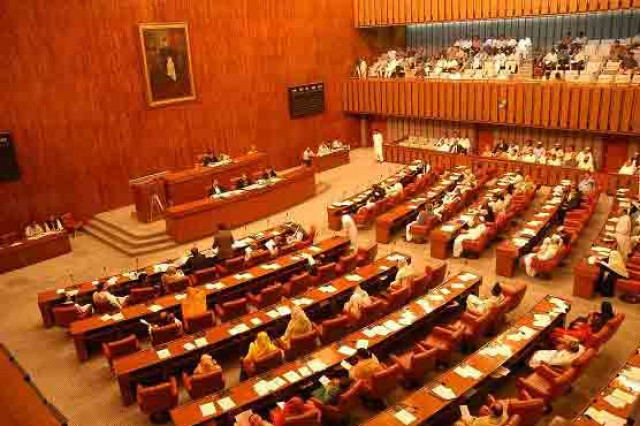PCNS: Panel finalising draft of missing persons law
Committee looking to balance national security and human rights.

The Parliamentary Committee on National Security (PCNS) is considering enacting a time-bound and area-specific law to resolve the burning issue of enforced disappearances which are more often than not blamed on the intelligence agencies.
A draft to this effect may make its way to parliament as early as during this budget session.
The committee, furnishing recommendations for the government to legislate on ‘missing’ persons, decided into divide terror suspects in three categories – white, grey and black, while refusing to give secret outfits sweeping powers to pick and interrogate the suspects for an indefinite period.
However, after the six-hour meeting here on Thursday, a committee member told The Express Tribune that the panel would try to reach some middle ground to strike a balance between national security considerations and human rights issues.
“Obviously, our basic aim is to make sure that people are not victimised on suspicions of involvement in terrorism … but we cannot totally ignore the demands of security agencies because the threat is real,” said the member.
The 13-member bipartisan, bicameral committee was briefed by the interior ministry, the National Counter Terrorism Authority (Nacta), the Federal Investigation Agency (FIA) and law division.
The member said the panel would begin drafting the proposed law – for which a nomenclature related to missing persons is also being contemplated – and hoped the draft would be presented to the National Assembly during the budget session, starting today (Friday).
Officials present at the meeting said that the panel, which was also briefed by the Inter Services Intelligence (ISI) earlier in the week, studied models adopted by the US, UK, South Africa and Indonesia to deal with particular problems in a specific region.
According to the proposals likely to be finalised, the jurisdiction of the new law on missing persons would be limited only to the areas where the problem exists and will not be applicable throughout the country.
Balochistan, parts of Khyber-Pakhtunkhwa and southern districts of Punjab might come under the jurisdiction of the law.
Moreover, said one participant, the law is not being enacted permanently and would cease to exist if and when the menace of enforced disappearances ends.
White, grey and black
The most contentious issue the new law will address is whether secret agencies, including the ISI, should be given sweeping powers of picking up and detaining terror suspects for an indefinite period.
Military authorities in the past had been demanding that, similar to the tribal areas, secret agencies should be allowed to interrogate suspects for 120 days without producing them in courts.
But committee members said the time period might be reduced to 90 days for settled areas, and the terror suspects would not be kept in detention without informing civilian authorities and families, as well.
It will also be binding for the secret agencies to decide within a certain period of time – probably in 15 days – which category a suspect falls under.
If no evidence proving links with or involvement in terrorism is found, the suspect would fall in the white category, meaning the agencies would have to release him/her in 15 days.
In case evidence is not good enough to establish direct link, the suspect would then fall in the grey category, and would be released on some guarantees.
The suspects who would fall in the black category because of direct links with terrorists, would face 90 days interrogation by the secret agencies. But even in that case, the suspects would be handed over to civilian agencies and produce in a court of law after 90 days.
Published in The Express Tribune, June 1st, 2012.



















COMMENTS
Comments are moderated and generally will be posted if they are on-topic and not abusive.
For more information, please see our Comments FAQ